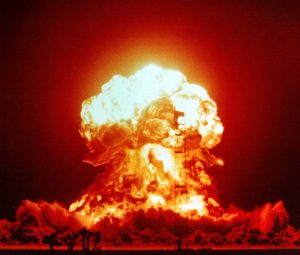Here are some general interest links to close out the week:
The Diplomat has followed closely the U.S. and Chinese efforts to develop a hypersonic missile capability. Over at the Bulletin of Atomic Scientists, Mark Gubrud makes the case for a treaty prohibiting hypersonic missiles before these efforts reach fruition. “It is important for the United States — the world leader in hypersonic missile development — to pursue an international hypersonic missile test ban, which could be easily verified and, once put in place, would end an arms race that already involves the United States, China, Russia, and India, with France, the United Kingdom and probably other countries lurking in the wings.”
Yesterday on Flashpoints, after noting that Russia will conduct another nuclear exercise later this month, I mentioned that Moscow’s military doctrine allows for the possibility of using nuclear weapons to counter conventional military attacks — a process Russia naturally refers to as “de-escalation.” Nikolai N. Sokov, who previously worked at the Soviet Union and Russian Foreign Ministries, takes to the Bulletin to explain the concept.
Bloomberg News notes that the U.S. market is no longer as important for Asia’s largest exporters as it used to be. “A renaissance in U.S. manufacturing is reducing demand for imports” from the region, the article notes, a trend most experts expect to continue in the coming years. To no one’s surprise, China’s relative importance to Asian exporters is growing; last year China was the top destination for exports from Malaysia, Thailand, Indonesia, the Philippines, South Korea and Japan.
Bloomberg News also scored an exclusive interview with the Philippines new military chief, Gregorio Pio Catapang. Not surprisingly, China is the top concern for Catapang, and for good reason; as Bloomberg points out, “China’s defense budget this year is about 47 times that of the Philippines’.” In any case, in the article Catapang discusses the military modernization plan the Philippines is undertaking with the goal of building a world class military by 2028.
Building a world class military is important, but it brings its own troubles. One of the most important problems is being able to use a strong military to successfully to achieve political ends. Not only have some of the world’s best militaries struggled to do this in recent decades, they’ve actually struggled to determine how to tell whether they are winning or losing. As such, “operations assessment,” which aims to find ways to measure success in war, has emerged as an increasingly important field in the military and security studies communities. The study, entitled “Are We Winning: A Brief History of Military Operations Assessment,” is available on CNA’s website.
Not long ago I argued that foreign policy is irrelevant in most U.S. presidential elections. I should have been more clear on this issue. Although foreign policy is largely irrelevant in determining who people vote for, it is highly relevant for those trying to predict who will run as presidential candidates all try to beef up their foreign policy credentials both before and after they enter the race. And in the United States, there is no better way to demonstrate you have what it takes on the foreign policy front that tying yourself to Henry Kissinger.
Which is why I suspect that Hillary Clinton — an almost certain presidential candidate who already has a wealth of foreign policy experience — decided to review Kissinger’s forthcoming book World Order for the Washington Post. Her conclusion, not surprisingly, is that Kissinger’s strategic vision “largely fits with the broad strategy behind the Obama administration’s effort over the past six years to build a global architecture of security and cooperation for the 21st century.” She further notes that Kissinger’s assessment of contemporary Asia mirrors the one she outlined in her recent presidential campaign foreign policy manifesto/memoir. Clinton is also careful to mention that “Kissinger is a friend, and I relied on his counsel when I served as secretary of state.” Well played, Madame Secretary.
Of course, the most important story of the week is the start of the NFL season. For the occasion, the Wall Street Journal “takes a peek” inside every team’s playbook. Note: The article was written before Thursday’s game, so the entry on the Green Bay Packers may be outdated.

































